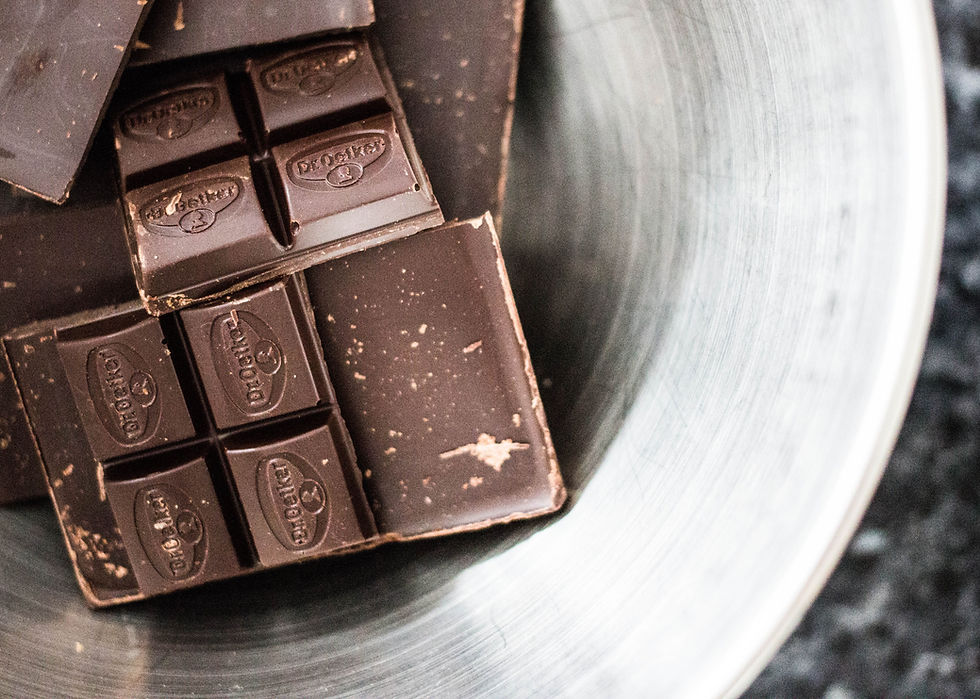What foods help with stress and how do they work?
- Helin Tezcanli

- Jun 15, 2020
- 6 min read
Stress. A headache as old as time, mysterious remedies which include Celtic music, candles, cuddles and some calming yoga. But many of us forget that what we put in our stomachs affects our moods.
I have spoken to some nutritional experts to get an insight into what foods can help with stress, how they work and why they are needed during these stressful times amid COVID-19 concerns.
What is stress?
Stress is a bodily reaction to emotional or mental pressures. In 2018, according to the Mental Health Foundation UK, 74% of adults had experienced stress so severe that they felt overwhelmed or unable to cope.
We all respond to stress differently, depending on our environment and our life experiences. Even our genes can affect how we handle stress. According to the Yale School of Medicine, women often think and talk more about their stress and its cause, while men tend to do physical activities to distract themselves from stress. But our brains fundamentally all work in the same way; we all run out of the same nutrients when we are stressed like Magnesium and Vitamin C. So, naturally, our brains require replenishment of these nutrients and other elements that improve brain function.
What foods are said to help with stress?
It is easy to fall down the internet rabbit hole of thousands of websites, providing thousands of food suggestions. Unfortunately, they do not always give the same answers or explanations on how the foods help or how to incorporate them into our diet. Separating the real from the fake, the helpful from the unhealthy can be stressful in itself.
By trolling through all Google results for ‘Foods That Reduce Stress’ between April 2019 and April 2020, I found that over 1,823 ingredients were suggested. The top three suggestions that were mentioned most were dark chocolate (69 mentions), spinach (66 mentions) and salmon (62 mentions).
These foods by themselves will not immediately stop stress; they need to be incorporated into a broader and healthier diet to provide long term benefits. And as with most things, excessive amounts can do more harm than good.
While these articles en masse are confusing the fact that there are so many, shows how in-demand such stress-relieving food suggestions are. But how do we react to these suggestions, are we put off by the scientific jargon or do we only pay attention to the suggestions that we actually want to eat. Lucy Peel, a qualified and experienced naturopath, explains how we as humans respond to moments of stress and these apparent food solutions.
Dark Chocolate

There is a lack of substantial evidence to suggest that dark chocolate can definitively help with stress. But there are some elements within it that could help.
For example, the cocoa in dark chocolate contains an organic chemical called Polyphenols. Sophie Medlin, a consultant dietitian, says that "Polyphenols help us with our brain function in lots of different ways. And we think it's related to either the production of vitamins, particular vitamins that help to manage the hormone levels in our brain. Or it is to do with blood flow into the brain. So kind of early research into these Polyphenols and how they work, there are lots of different theories".
Also, Endorphins (hormones) are released when eating chocolate, providing a euphoric state for the brain and body. Another possible factor could be that dark chocolate has been claimed to improve Serotonin levels in the brain, particularly dark chocolate that has at least 85% cocoa. Serotonin is a mood-altering hormone that is found in some antidepressants.
Spinach

A key element of spinach and other leafy greens is Magnesium. Magnesium is a natural muscle relaxant. It can relax the nervous system and is an essential mineral that helps with irritability and restlessness. Sources such as WebMD claim that "too little magnesium may trigger headaches and fatigue, compounding the effects of stress".
In 2018, a study tested three different extracts of spinach and their anti-stress effects on mice. It measured the levels of Corticosterone in their blood (this hormone is responsible for controlling stress responses in rodents). The study’s conclusions found that the Corticosterone levels decreased when the mice ate the spinach extracts.
Salmon

Oily fish, especially salmon, is beneficial because of the fatty acids within it called Omega-3. And there is a specific fatty acid chain called DHA, which your brain is largely made up of. “Not having enough salmon or oily fish in your diet is a bit like taking out 25% of the bricks of your house and then replacing them with polystyrene. It can work the same, but it won’t function the same,” explains Sophie Medlin. Also, a study in 2000, found that experiment groups with a higher DHA intake had a decrease of Norepinephrine (a stress hormone). Are there any other recommended foods? “Cheese is very rich in Tryptophan. Tryptophan is a precursor of Serotonin. Cheese has quite a calming effect. People do crave cheese normally, for example, women usually crave cheese before their period because of the calcium and Tryptophan. It is one of the reasons why mothers usually give milk to children before going to bed,” says nutritionist and scientist, Dr Claudia Gravaghi. What are the links between food and stress? The answer: we don't know. When people are stressed, or they get diagnosed with depression or anxiety, they also tend to have nutritional deficiencies. What scientists have not been able to figure out is whether the deficiencies drive the stress, or whether stressed individuals are causing the deficiencies by having a poor diet. We all know what happens when we are stressed, right? We get takeaways, we eat chocolate and we can't be bothered to think about proper meals. Sometimes we don’t eat at all. But because these options provide no valuable nutrients for our brain, it can become a vicious cycle of stress.
What are the common misconceptions? When an article provides you with a list of foods that help with stress, this does not mean eating a salmon on a stressful Monday is going to help you. As we mentioned earlier, the whole diet needs to be considered. These 'quick fix' misconceptions spring from how these foods are framed in the articles. They tend to single out certain foods rather than talking about meals. For example, by concentrating on one aspect of a single strawberry and how that element can help with stress, people often forget the broader issue of the diet. What are the trends? Nutritionists and online sources say that there is not one specific 'Stress Diet'. There are popular food trends in the nutritional industry, but for every pro, there is an inevitable con. One diet suggestion is known as the ketogenic or keto diet. This diet involves replacing your regular carbohydrate intake with fat, meaning that the body now burns these fats instead. By doing this, it is said to increase the production of GABA, which is a neurotransmitter that decreases the activity in the nervous system. Therefore, leading to reduced stress and anxiety. However, the keto diet could be seen as quite controversial and problematic. Allegedly, it can cause fatigue and can affect the muscles. It can also cause stress on the body as the fundamental elements of the diet (e.g. changing what we use for energy) is a significant change to the way the body usually works. Another suggestion is the Mediterranean diet. This diet is low in dairy and meat but high in fruit, veg, nuts, grains, fish and olive oil. Interestingly, a Spanish study found that participants that consumed a Mediterranean diet were 50% less likely to develop anxiety or depression. But, as the diet suggests ingredients like olive oil and nuts which are high in fat, this could lead to weight gain (not an ideal outcome for stress). Also, by not consuming dairy products, this could lead to some people not experiencing the anti-stress benefits of cheese, milk and yoghurt. What makes it so relevant to the current COVID-19 climate?
At times like these, it is easy to order a contact-free takeaway with just a few clicks. On top of that, the limited supplies from supermarkets, both in-person and online, have steered the public more and more towards foods that are not necessarily the best choices for our brains. By thinking twice about buying that Diet Coke and Galaxy bar and by considering the stress that inevitably awaits us all in the confines of quarantine, we can start improving our diets to help our moods and manage our stress.







Comments